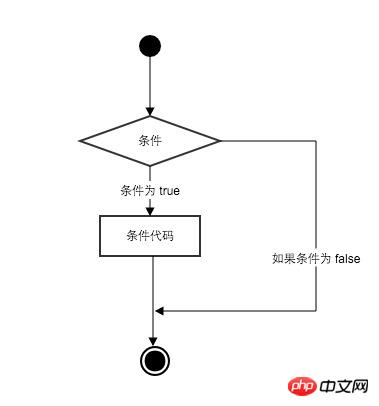ホームページ >バックエンド開発 >Python チュートリアル >Pythonでのif条件判定コードの解析
Pythonでのif条件判定コードの解析
- 不言オリジナル
- 2018-09-20 16:12:362398ブラウズ
この記事の内容はPythonのif条件判定コードの解析に関するものですが、一定の参考価値はありますので、困っている方は参考にしていただければ幸いです。
条件文の実行処理:

if条件判定に関する注意:
1. 各条件 : の後にコロンを使用して、条件が True の場合に実行されるコードを示します。
2. インデントを使用してコード ブロックを分割する同じインデント番号を持つステートメントがまとめてコード ブロックを形成します。
#if...else、単一条件判定
username_store = 'lipandeng'
password_store = '123'
username_input = input('your username:')
password_input = input('your password:')
if username_input == username_store and password_input == password_input:
print('welcome {0}'.format(username_input))
else:
print('Invalid username and password!')
if...elif.. .else、複数条件判定
score = int(input('Enter your score:')) # input()返回的数据类型是str,int()函数是把str转int。
if score < 0 or score > 100: # 条件1,此条件为True时执行print(),elif后面的代码不再执行。
print('Scores of the range is 0-100.')
elif score >= 90: # 条件2,当条件1为False时判断条件2,此条件为True时执行print(),elif后面的代码不再执行。
print('Your score is excellent.')
elif score >= 60: # 条件3,当条件1和条件2为False时判断条件3,此条件为True时后执行print(),elif后面的代码不再执行。
print('Your score is good.')
else: # 条件4,以上判断条件都为False时执行的print()。
print('Your score is not pass the exam.')以上がPythonでのif条件判定コードの解析の詳細内容です。詳細については、PHP 中国語 Web サイトの他の関連記事を参照してください。
声明:
この記事の内容はネチズンが自主的に寄稿したものであり、著作権は原著者に帰属します。このサイトは、それに相当する法的責任を負いません。盗作または侵害の疑いのあるコンテンツを見つけた場合は、admin@php.cn までご連絡ください。

